AM906001 Corporate Governance and Leadership: Facebook Scandal Report
VerifiedAdded on 2023/06/03
|12
|2896
|360
Report
AI Summary
This report critically evaluates the corporate governance issues arising from the Facebook Cambridge Analytica scandal, referencing an article from The Guardian. It examines the stakeholder approach, its impact on organizations, and provides a description of Facebook and its governance structure. The report delves into the data breach issue, its impact on Facebook, and its effect on stakeholders, including the ethical and social responsibility dimensions. It also addresses sustainability and leadership challenges faced by Facebook during the scandal. The analysis covers relevant legislation, compliance failures, and the lack of ethical considerations in Facebook's business strategies. The report concludes by highlighting the importance of stakeholder approach and compliance with corporate governance policies, emphasizing the need for improved security measures and ethical leadership to prevent future data breaches. This report is from the Auckland International Campus, AM906001 Corporate Governance and Leadership course.
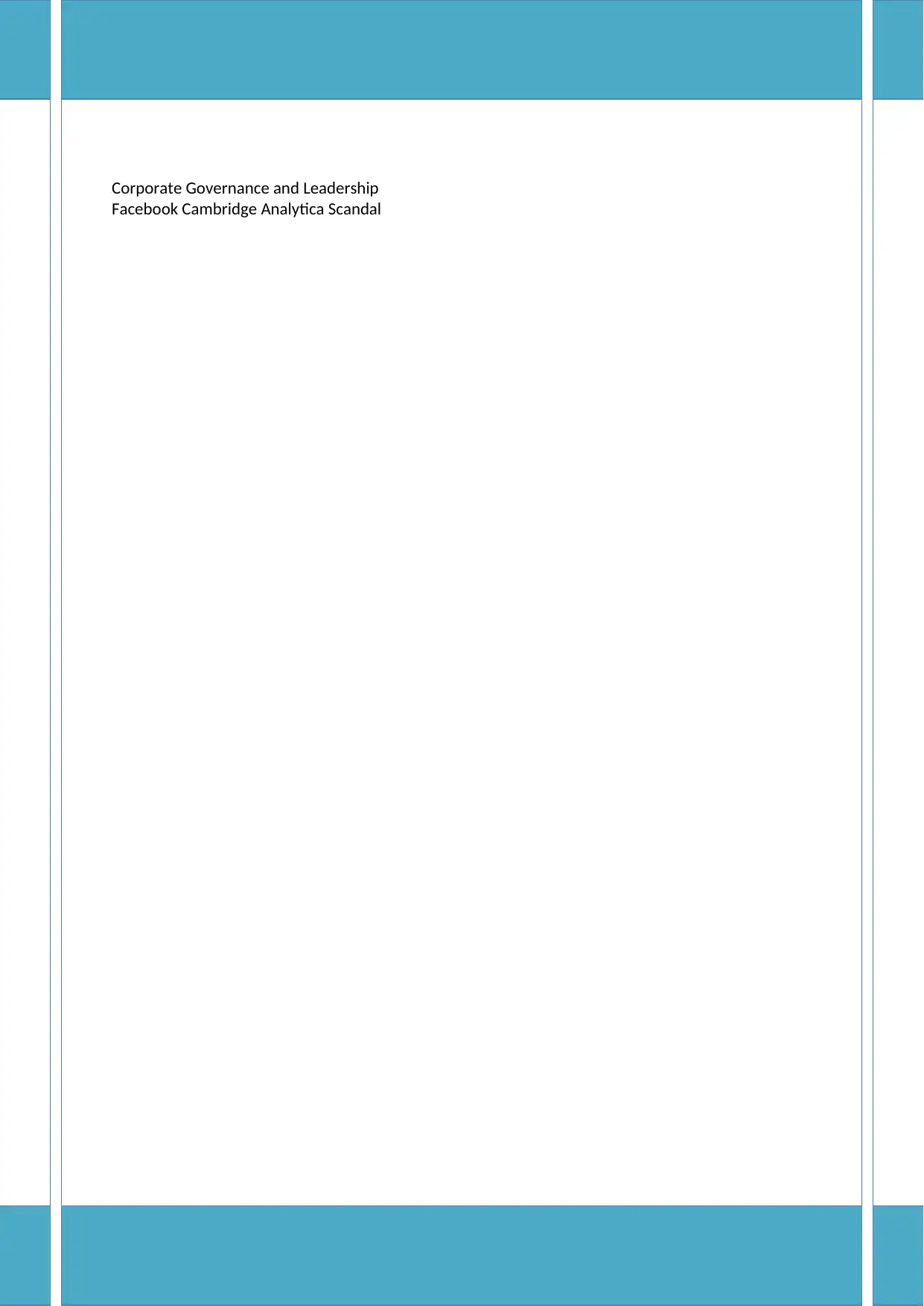
Corporate Governance and Leadership
Facebook Cambridge Analytica Scandal
Facebook Cambridge Analytica Scandal
Paraphrase This Document
Need a fresh take? Get an instant paraphrase of this document with our AI Paraphraser
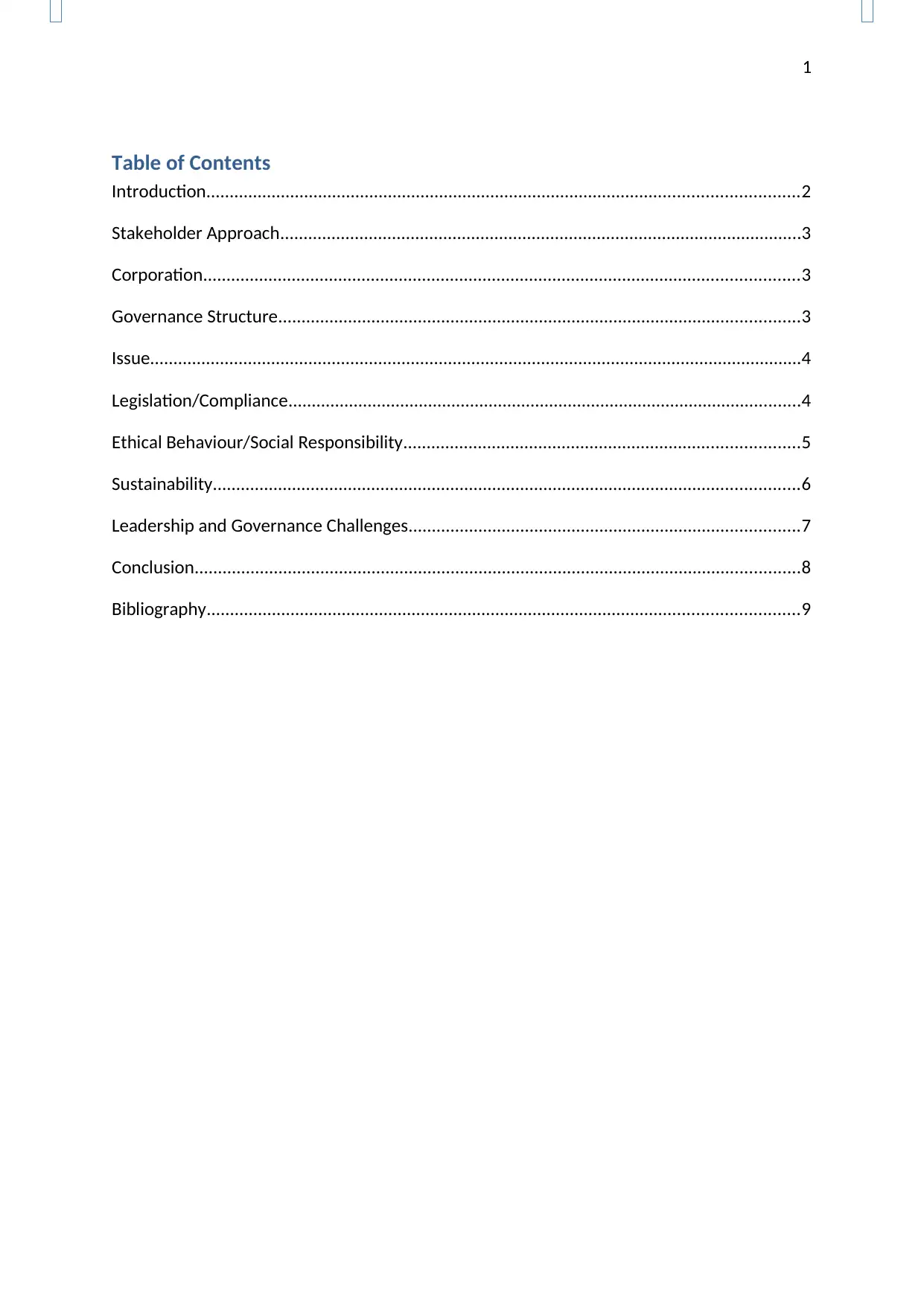
1
Table of Contents
Introduction...............................................................................................................................2
Stakeholder Approach................................................................................................................3
Corporation................................................................................................................................3
Governance Structure................................................................................................................3
Issue............................................................................................................................................4
Legislation/Compliance..............................................................................................................4
Ethical Behaviour/Social Responsibility.....................................................................................5
Sustainability..............................................................................................................................6
Leadership and Governance Challenges....................................................................................7
Conclusion..................................................................................................................................8
Bibliography...............................................................................................................................9
Table of Contents
Introduction...............................................................................................................................2
Stakeholder Approach................................................................................................................3
Corporation................................................................................................................................3
Governance Structure................................................................................................................3
Issue............................................................................................................................................4
Legislation/Compliance..............................................................................................................4
Ethical Behaviour/Social Responsibility.....................................................................................5
Sustainability..............................................................................................................................6
Leadership and Governance Challenges....................................................................................7
Conclusion..................................................................................................................................8
Bibliography...............................................................................................................................9
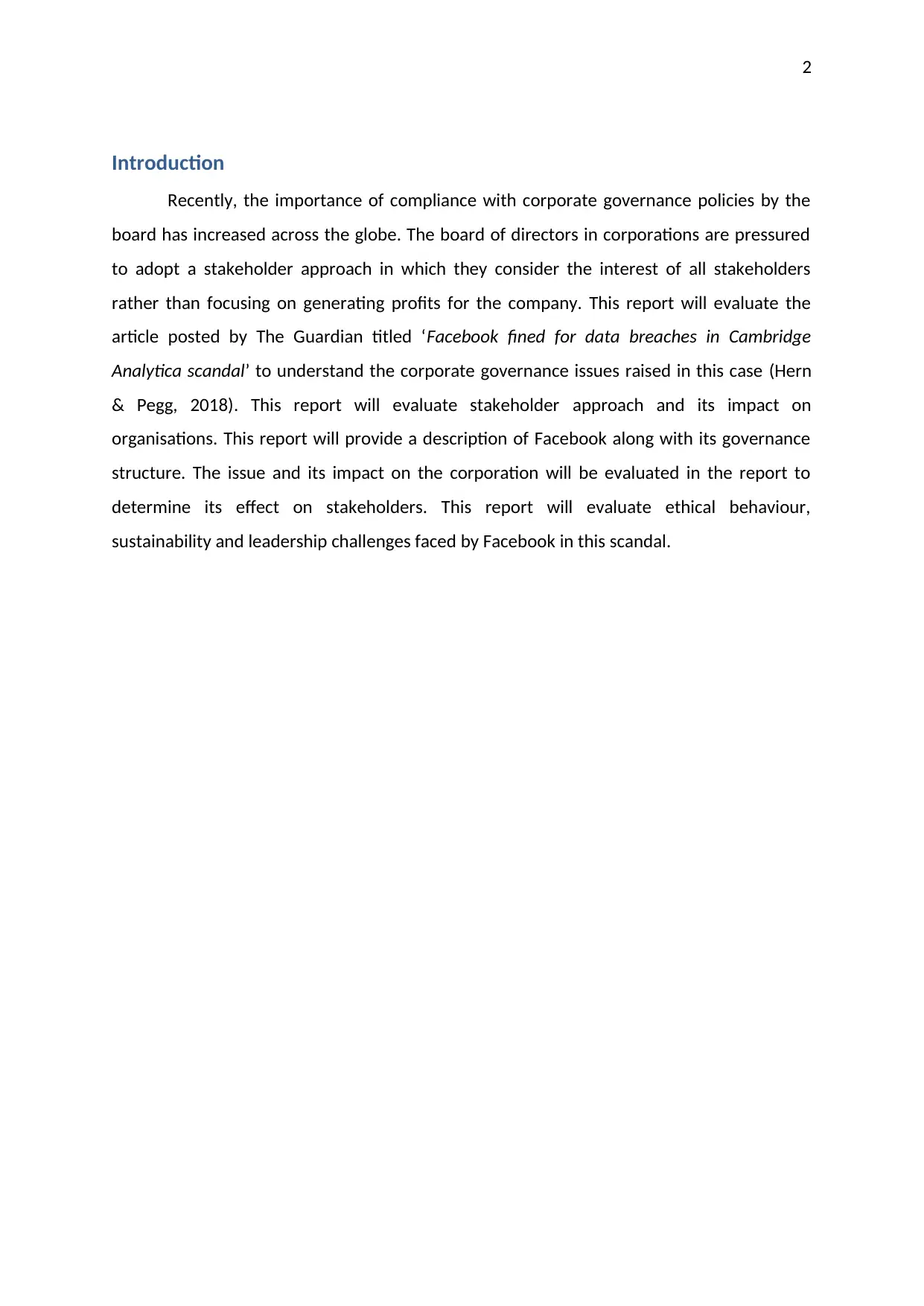
2
Introduction
Recently, the importance of compliance with corporate governance policies by the
board has increased across the globe. The board of directors in corporations are pressured
to adopt a stakeholder approach in which they consider the interest of all stakeholders
rather than focusing on generating profits for the company. This report will evaluate the
article posted by The Guardian titled ‘Facebook fined for data breaches in Cambridge
Analytica scandal’ to understand the corporate governance issues raised in this case (Hern
& Pegg, 2018). This report will evaluate stakeholder approach and its impact on
organisations. This report will provide a description of Facebook along with its governance
structure. The issue and its impact on the corporation will be evaluated in the report to
determine its effect on stakeholders. This report will evaluate ethical behaviour,
sustainability and leadership challenges faced by Facebook in this scandal.
Introduction
Recently, the importance of compliance with corporate governance policies by the
board has increased across the globe. The board of directors in corporations are pressured
to adopt a stakeholder approach in which they consider the interest of all stakeholders
rather than focusing on generating profits for the company. This report will evaluate the
article posted by The Guardian titled ‘Facebook fined for data breaches in Cambridge
Analytica scandal’ to understand the corporate governance issues raised in this case (Hern
& Pegg, 2018). This report will evaluate stakeholder approach and its impact on
organisations. This report will provide a description of Facebook along with its governance
structure. The issue and its impact on the corporation will be evaluated in the report to
determine its effect on stakeholders. This report will evaluate ethical behaviour,
sustainability and leadership challenges faced by Facebook in this scandal.
⊘ This is a preview!⊘
Do you want full access?
Subscribe today to unlock all pages.

Trusted by 1+ million students worldwide
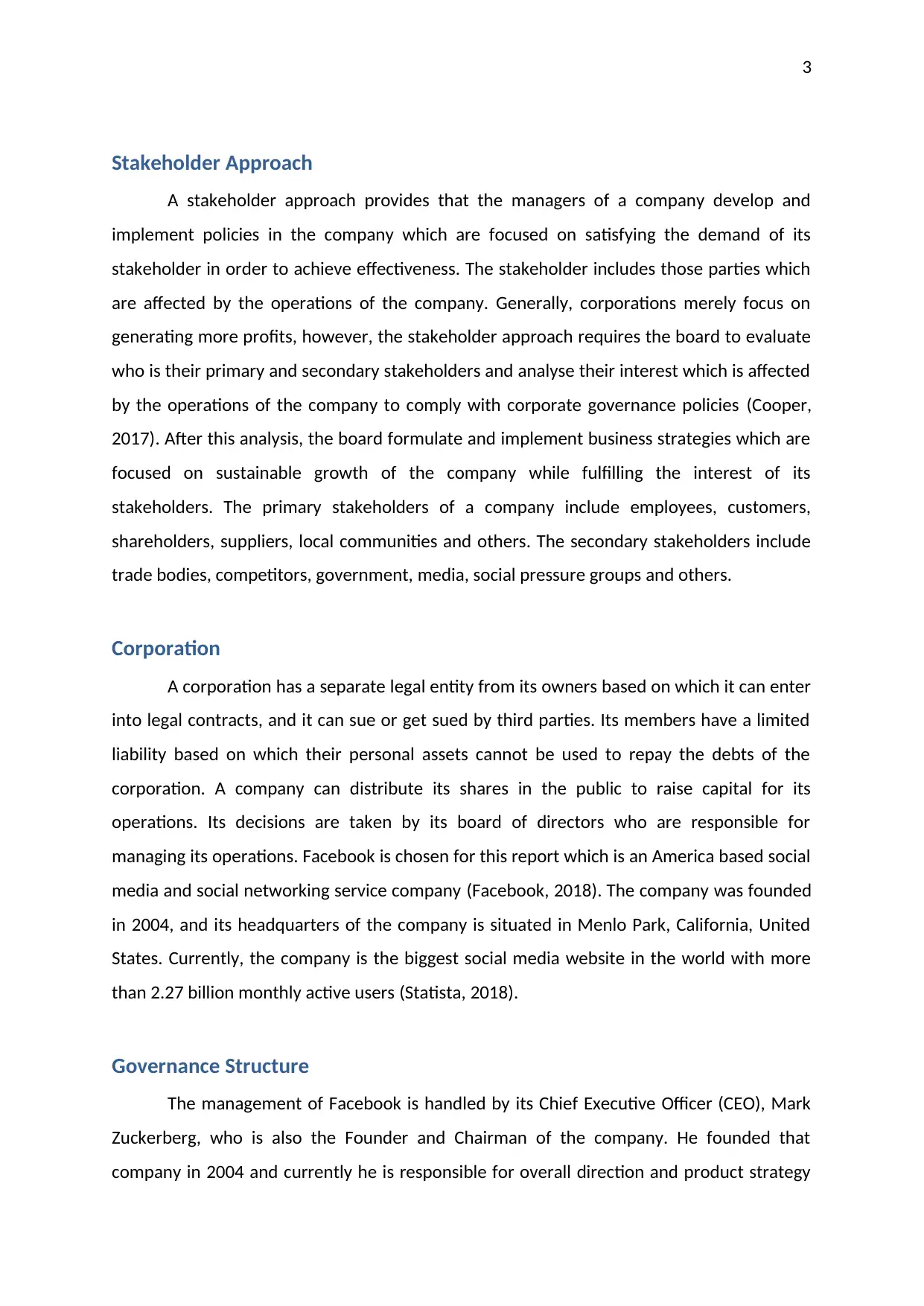
3
Stakeholder Approach
A stakeholder approach provides that the managers of a company develop and
implement policies in the company which are focused on satisfying the demand of its
stakeholder in order to achieve effectiveness. The stakeholder includes those parties which
are affected by the operations of the company. Generally, corporations merely focus on
generating more profits, however, the stakeholder approach requires the board to evaluate
who is their primary and secondary stakeholders and analyse their interest which is affected
by the operations of the company to comply with corporate governance policies (Cooper,
2017). After this analysis, the board formulate and implement business strategies which are
focused on sustainable growth of the company while fulfilling the interest of its
stakeholders. The primary stakeholders of a company include employees, customers,
shareholders, suppliers, local communities and others. The secondary stakeholders include
trade bodies, competitors, government, media, social pressure groups and others.
Corporation
A corporation has a separate legal entity from its owners based on which it can enter
into legal contracts, and it can sue or get sued by third parties. Its members have a limited
liability based on which their personal assets cannot be used to repay the debts of the
corporation. A company can distribute its shares in the public to raise capital for its
operations. Its decisions are taken by its board of directors who are responsible for
managing its operations. Facebook is chosen for this report which is an America based social
media and social networking service company (Facebook, 2018). The company was founded
in 2004, and its headquarters of the company is situated in Menlo Park, California, United
States. Currently, the company is the biggest social media website in the world with more
than 2.27 billion monthly active users (Statista, 2018).
Governance Structure
The management of Facebook is handled by its Chief Executive Officer (CEO), Mark
Zuckerberg, who is also the Founder and Chairman of the company. He founded that
company in 2004 and currently he is responsible for overall direction and product strategy
Stakeholder Approach
A stakeholder approach provides that the managers of a company develop and
implement policies in the company which are focused on satisfying the demand of its
stakeholder in order to achieve effectiveness. The stakeholder includes those parties which
are affected by the operations of the company. Generally, corporations merely focus on
generating more profits, however, the stakeholder approach requires the board to evaluate
who is their primary and secondary stakeholders and analyse their interest which is affected
by the operations of the company to comply with corporate governance policies (Cooper,
2017). After this analysis, the board formulate and implement business strategies which are
focused on sustainable growth of the company while fulfilling the interest of its
stakeholders. The primary stakeholders of a company include employees, customers,
shareholders, suppliers, local communities and others. The secondary stakeholders include
trade bodies, competitors, government, media, social pressure groups and others.
Corporation
A corporation has a separate legal entity from its owners based on which it can enter
into legal contracts, and it can sue or get sued by third parties. Its members have a limited
liability based on which their personal assets cannot be used to repay the debts of the
corporation. A company can distribute its shares in the public to raise capital for its
operations. Its decisions are taken by its board of directors who are responsible for
managing its operations. Facebook is chosen for this report which is an America based social
media and social networking service company (Facebook, 2018). The company was founded
in 2004, and its headquarters of the company is situated in Menlo Park, California, United
States. Currently, the company is the biggest social media website in the world with more
than 2.27 billion monthly active users (Statista, 2018).
Governance Structure
The management of Facebook is handled by its Chief Executive Officer (CEO), Mark
Zuckerberg, who is also the Founder and Chairman of the company. He founded that
company in 2004 and currently he is responsible for overall direction and product strategy
Paraphrase This Document
Need a fresh take? Get an instant paraphrase of this document with our AI Paraphraser
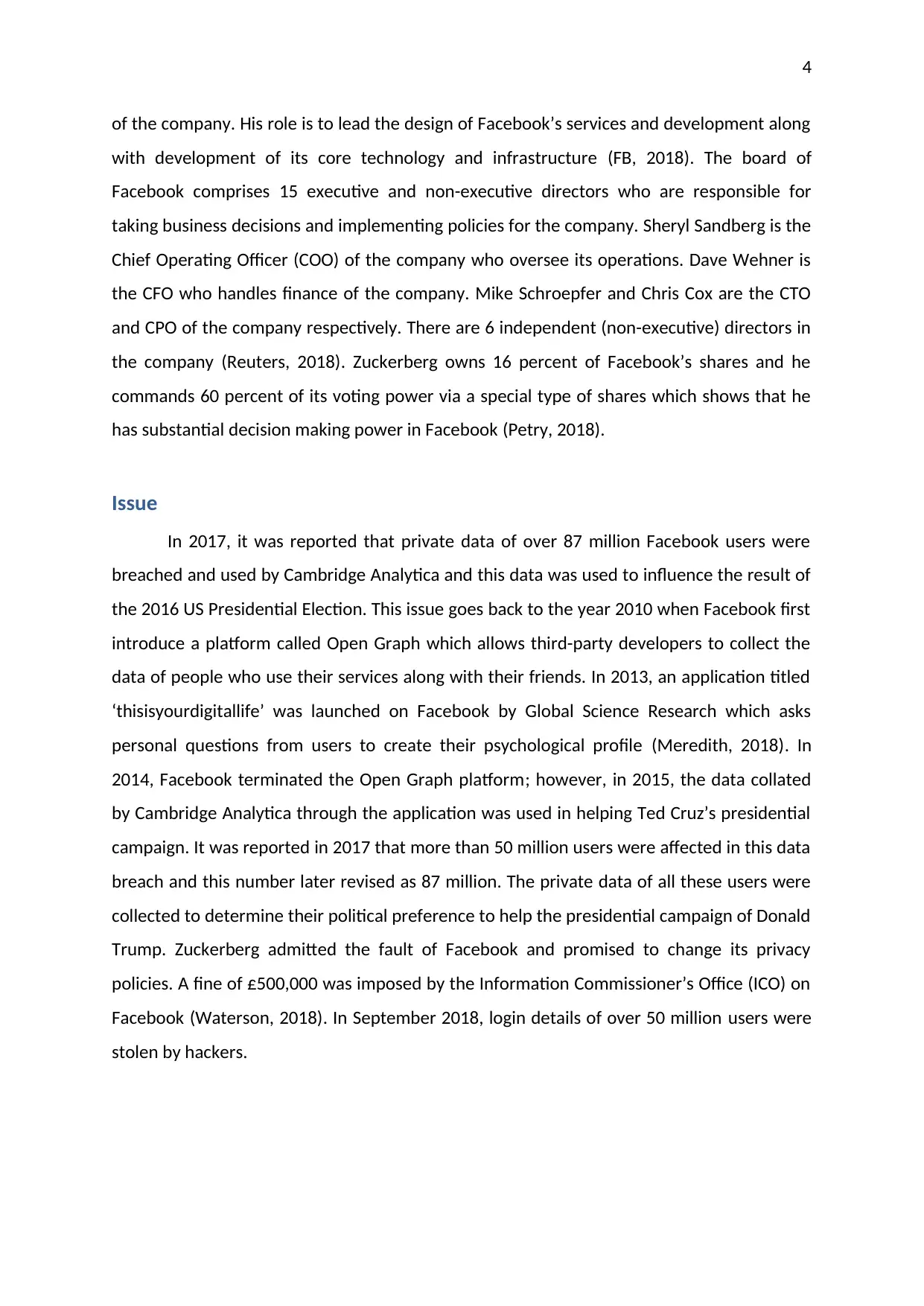
4
of the company. His role is to lead the design of Facebook’s services and development along
with development of its core technology and infrastructure (FB, 2018). The board of
Facebook comprises 15 executive and non-executive directors who are responsible for
taking business decisions and implementing policies for the company. Sheryl Sandberg is the
Chief Operating Officer (COO) of the company who oversee its operations. Dave Wehner is
the CFO who handles finance of the company. Mike Schroepfer and Chris Cox are the CTO
and CPO of the company respectively. There are 6 independent (non-executive) directors in
the company (Reuters, 2018). Zuckerberg owns 16 percent of Facebook’s shares and he
commands 60 percent of its voting power via a special type of shares which shows that he
has substantial decision making power in Facebook (Petry, 2018).
Issue
In 2017, it was reported that private data of over 87 million Facebook users were
breached and used by Cambridge Analytica and this data was used to influence the result of
the 2016 US Presidential Election. This issue goes back to the year 2010 when Facebook first
introduce a platform called Open Graph which allows third-party developers to collect the
data of people who use their services along with their friends. In 2013, an application titled
‘thisisyourdigitallife’ was launched on Facebook by Global Science Research which asks
personal questions from users to create their psychological profile (Meredith, 2018). In
2014, Facebook terminated the Open Graph platform; however, in 2015, the data collated
by Cambridge Analytica through the application was used in helping Ted Cruz’s presidential
campaign. It was reported in 2017 that more than 50 million users were affected in this data
breach and this number later revised as 87 million. The private data of all these users were
collected to determine their political preference to help the presidential campaign of Donald
Trump. Zuckerberg admitted the fault of Facebook and promised to change its privacy
policies. A fine of £500,000 was imposed by the Information Commissioner’s Office (ICO) on
Facebook (Waterson, 2018). In September 2018, login details of over 50 million users were
stolen by hackers.
of the company. His role is to lead the design of Facebook’s services and development along
with development of its core technology and infrastructure (FB, 2018). The board of
Facebook comprises 15 executive and non-executive directors who are responsible for
taking business decisions and implementing policies for the company. Sheryl Sandberg is the
Chief Operating Officer (COO) of the company who oversee its operations. Dave Wehner is
the CFO who handles finance of the company. Mike Schroepfer and Chris Cox are the CTO
and CPO of the company respectively. There are 6 independent (non-executive) directors in
the company (Reuters, 2018). Zuckerberg owns 16 percent of Facebook’s shares and he
commands 60 percent of its voting power via a special type of shares which shows that he
has substantial decision making power in Facebook (Petry, 2018).
Issue
In 2017, it was reported that private data of over 87 million Facebook users were
breached and used by Cambridge Analytica and this data was used to influence the result of
the 2016 US Presidential Election. This issue goes back to the year 2010 when Facebook first
introduce a platform called Open Graph which allows third-party developers to collect the
data of people who use their services along with their friends. In 2013, an application titled
‘thisisyourdigitallife’ was launched on Facebook by Global Science Research which asks
personal questions from users to create their psychological profile (Meredith, 2018). In
2014, Facebook terminated the Open Graph platform; however, in 2015, the data collated
by Cambridge Analytica through the application was used in helping Ted Cruz’s presidential
campaign. It was reported in 2017 that more than 50 million users were affected in this data
breach and this number later revised as 87 million. The private data of all these users were
collected to determine their political preference to help the presidential campaign of Donald
Trump. Zuckerberg admitted the fault of Facebook and promised to change its privacy
policies. A fine of £500,000 was imposed by the Information Commissioner’s Office (ICO) on
Facebook (Waterson, 2018). In September 2018, login details of over 50 million users were
stolen by hackers.
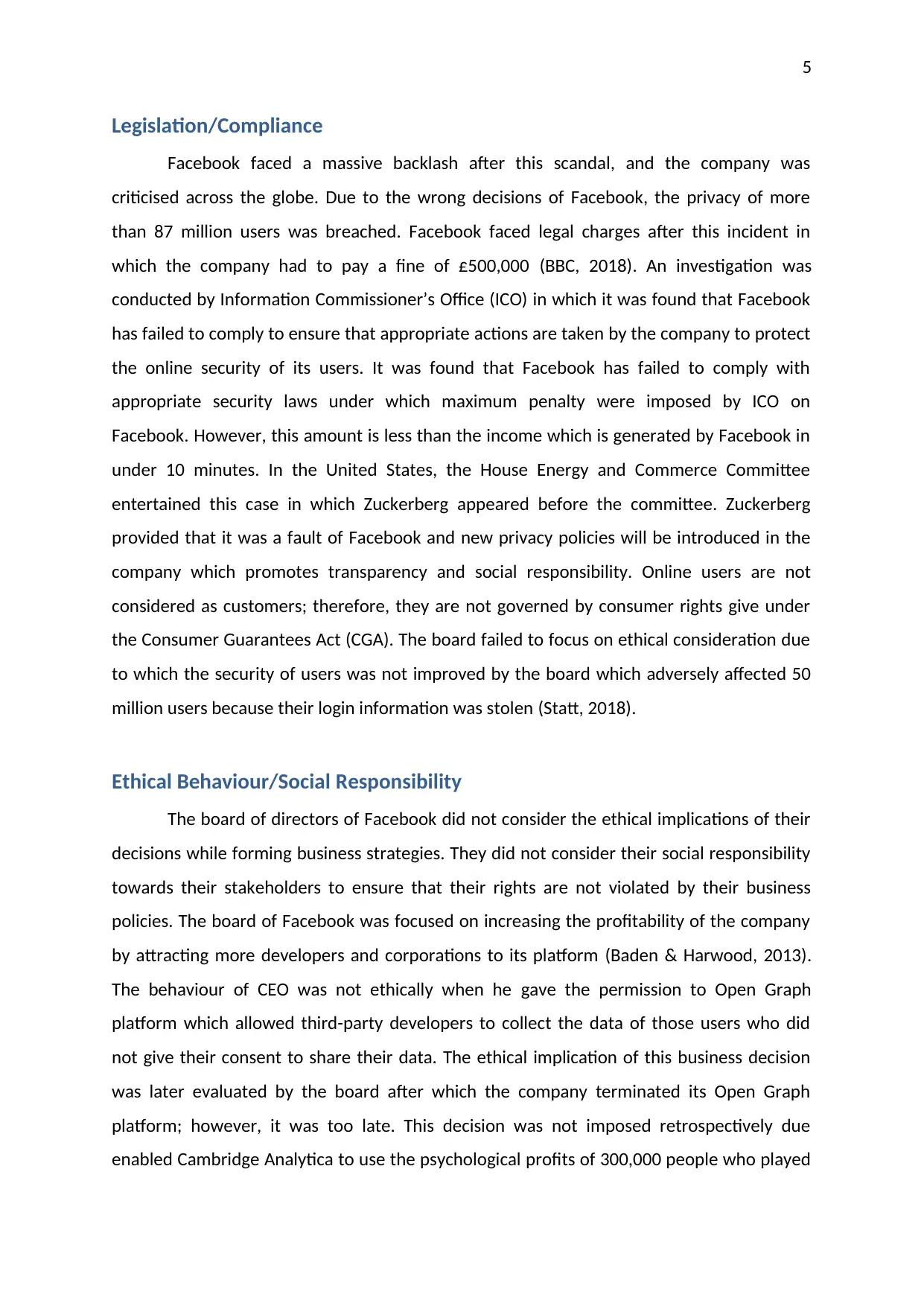
5
Legislation/Compliance
Facebook faced a massive backlash after this scandal, and the company was
criticised across the globe. Due to the wrong decisions of Facebook, the privacy of more
than 87 million users was breached. Facebook faced legal charges after this incident in
which the company had to pay a fine of £500,000 (BBC, 2018). An investigation was
conducted by Information Commissioner’s Office (ICO) in which it was found that Facebook
has failed to comply to ensure that appropriate actions are taken by the company to protect
the online security of its users. It was found that Facebook has failed to comply with
appropriate security laws under which maximum penalty were imposed by ICO on
Facebook. However, this amount is less than the income which is generated by Facebook in
under 10 minutes. In the United States, the House Energy and Commerce Committee
entertained this case in which Zuckerberg appeared before the committee. Zuckerberg
provided that it was a fault of Facebook and new privacy policies will be introduced in the
company which promotes transparency and social responsibility. Online users are not
considered as customers; therefore, they are not governed by consumer rights give under
the Consumer Guarantees Act (CGA). The board failed to focus on ethical consideration due
to which the security of users was not improved by the board which adversely affected 50
million users because their login information was stolen (Statt, 2018).
Ethical Behaviour/Social Responsibility
The board of directors of Facebook did not consider the ethical implications of their
decisions while forming business strategies. They did not consider their social responsibility
towards their stakeholders to ensure that their rights are not violated by their business
policies. The board of Facebook was focused on increasing the profitability of the company
by attracting more developers and corporations to its platform (Baden & Harwood, 2013).
The behaviour of CEO was not ethically when he gave the permission to Open Graph
platform which allowed third-party developers to collect the data of those users who did
not give their consent to share their data. The ethical implication of this business decision
was later evaluated by the board after which the company terminated its Open Graph
platform; however, it was too late. This decision was not imposed retrospectively due
enabled Cambridge Analytica to use the psychological profits of 300,000 people who played
Legislation/Compliance
Facebook faced a massive backlash after this scandal, and the company was
criticised across the globe. Due to the wrong decisions of Facebook, the privacy of more
than 87 million users was breached. Facebook faced legal charges after this incident in
which the company had to pay a fine of £500,000 (BBC, 2018). An investigation was
conducted by Information Commissioner’s Office (ICO) in which it was found that Facebook
has failed to comply to ensure that appropriate actions are taken by the company to protect
the online security of its users. It was found that Facebook has failed to comply with
appropriate security laws under which maximum penalty were imposed by ICO on
Facebook. However, this amount is less than the income which is generated by Facebook in
under 10 minutes. In the United States, the House Energy and Commerce Committee
entertained this case in which Zuckerberg appeared before the committee. Zuckerberg
provided that it was a fault of Facebook and new privacy policies will be introduced in the
company which promotes transparency and social responsibility. Online users are not
considered as customers; therefore, they are not governed by consumer rights give under
the Consumer Guarantees Act (CGA). The board failed to focus on ethical consideration due
to which the security of users was not improved by the board which adversely affected 50
million users because their login information was stolen (Statt, 2018).
Ethical Behaviour/Social Responsibility
The board of directors of Facebook did not consider the ethical implications of their
decisions while forming business strategies. They did not consider their social responsibility
towards their stakeholders to ensure that their rights are not violated by their business
policies. The board of Facebook was focused on increasing the profitability of the company
by attracting more developers and corporations to its platform (Baden & Harwood, 2013).
The behaviour of CEO was not ethically when he gave the permission to Open Graph
platform which allowed third-party developers to collect the data of those users who did
not give their consent to share their data. The ethical implication of this business decision
was later evaluated by the board after which the company terminated its Open Graph
platform; however, it was too late. This decision was not imposed retrospectively due
enabled Cambridge Analytica to use the psychological profits of 300,000 people who played
⊘ This is a preview!⊘
Do you want full access?
Subscribe today to unlock all pages.

Trusted by 1+ million students worldwide
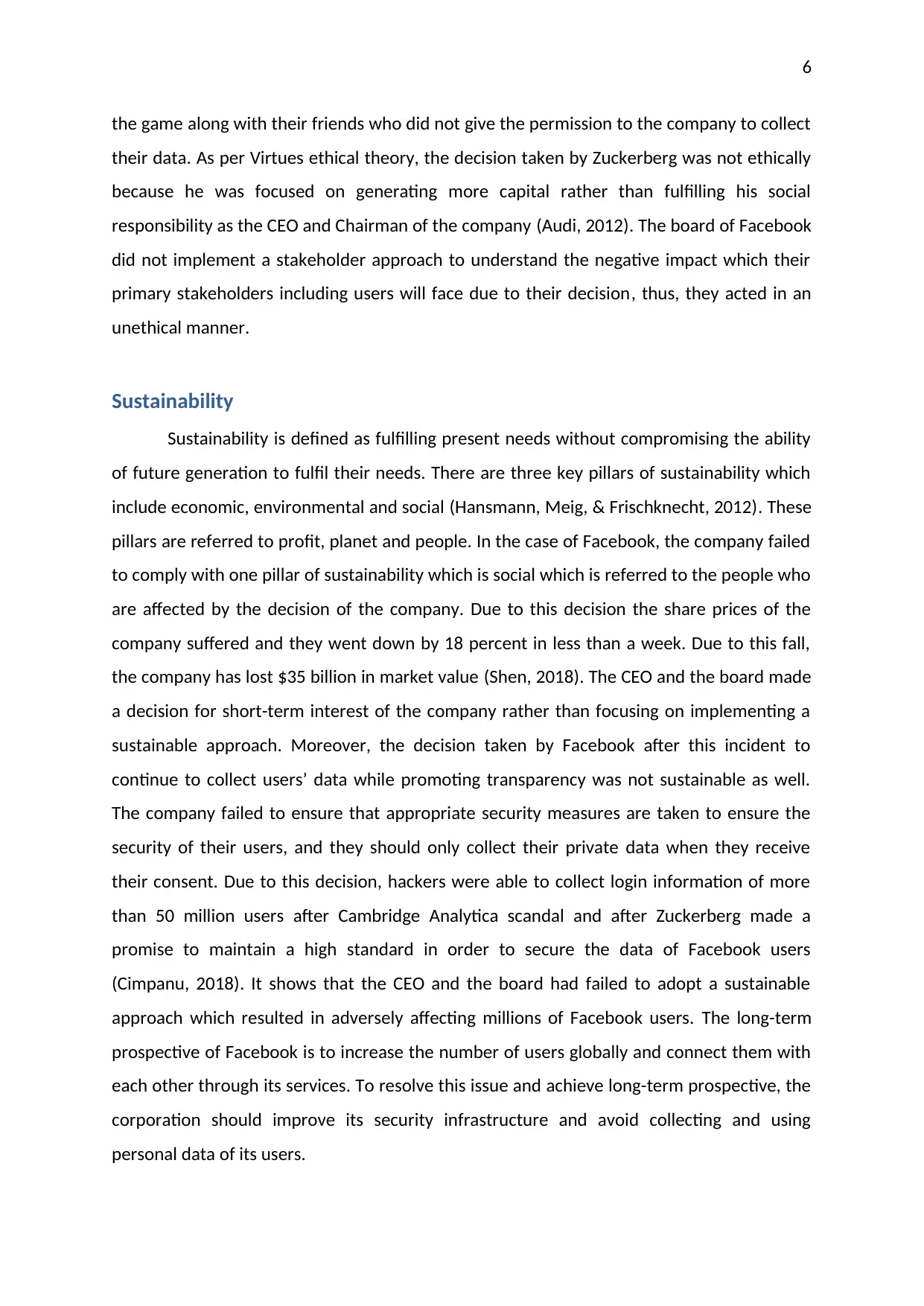
6
the game along with their friends who did not give the permission to the company to collect
their data. As per Virtues ethical theory, the decision taken by Zuckerberg was not ethically
because he was focused on generating more capital rather than fulfilling his social
responsibility as the CEO and Chairman of the company (Audi, 2012). The board of Facebook
did not implement a stakeholder approach to understand the negative impact which their
primary stakeholders including users will face due to their decision, thus, they acted in an
unethical manner.
Sustainability
Sustainability is defined as fulfilling present needs without compromising the ability
of future generation to fulfil their needs. There are three key pillars of sustainability which
include economic, environmental and social (Hansmann, Meig, & Frischknecht, 2012). These
pillars are referred to profit, planet and people. In the case of Facebook, the company failed
to comply with one pillar of sustainability which is social which is referred to the people who
are affected by the decision of the company. Due to this decision the share prices of the
company suffered and they went down by 18 percent in less than a week. Due to this fall,
the company has lost $35 billion in market value (Shen, 2018). The CEO and the board made
a decision for short-term interest of the company rather than focusing on implementing a
sustainable approach. Moreover, the decision taken by Facebook after this incident to
continue to collect users’ data while promoting transparency was not sustainable as well.
The company failed to ensure that appropriate security measures are taken to ensure the
security of their users, and they should only collect their private data when they receive
their consent. Due to this decision, hackers were able to collect login information of more
than 50 million users after Cambridge Analytica scandal and after Zuckerberg made a
promise to maintain a high standard in order to secure the data of Facebook users
(Cimpanu, 2018). It shows that the CEO and the board had failed to adopt a sustainable
approach which resulted in adversely affecting millions of Facebook users. The long-term
prospective of Facebook is to increase the number of users globally and connect them with
each other through its services. To resolve this issue and achieve long-term prospective, the
corporation should improve its security infrastructure and avoid collecting and using
personal data of its users.
the game along with their friends who did not give the permission to the company to collect
their data. As per Virtues ethical theory, the decision taken by Zuckerberg was not ethically
because he was focused on generating more capital rather than fulfilling his social
responsibility as the CEO and Chairman of the company (Audi, 2012). The board of Facebook
did not implement a stakeholder approach to understand the negative impact which their
primary stakeholders including users will face due to their decision, thus, they acted in an
unethical manner.
Sustainability
Sustainability is defined as fulfilling present needs without compromising the ability
of future generation to fulfil their needs. There are three key pillars of sustainability which
include economic, environmental and social (Hansmann, Meig, & Frischknecht, 2012). These
pillars are referred to profit, planet and people. In the case of Facebook, the company failed
to comply with one pillar of sustainability which is social which is referred to the people who
are affected by the decision of the company. Due to this decision the share prices of the
company suffered and they went down by 18 percent in less than a week. Due to this fall,
the company has lost $35 billion in market value (Shen, 2018). The CEO and the board made
a decision for short-term interest of the company rather than focusing on implementing a
sustainable approach. Moreover, the decision taken by Facebook after this incident to
continue to collect users’ data while promoting transparency was not sustainable as well.
The company failed to ensure that appropriate security measures are taken to ensure the
security of their users, and they should only collect their private data when they receive
their consent. Due to this decision, hackers were able to collect login information of more
than 50 million users after Cambridge Analytica scandal and after Zuckerberg made a
promise to maintain a high standard in order to secure the data of Facebook users
(Cimpanu, 2018). It shows that the CEO and the board had failed to adopt a sustainable
approach which resulted in adversely affecting millions of Facebook users. The long-term
prospective of Facebook is to increase the number of users globally and connect them with
each other through its services. To resolve this issue and achieve long-term prospective, the
corporation should improve its security infrastructure and avoid collecting and using
personal data of its users.
Paraphrase This Document
Need a fresh take? Get an instant paraphrase of this document with our AI Paraphraser
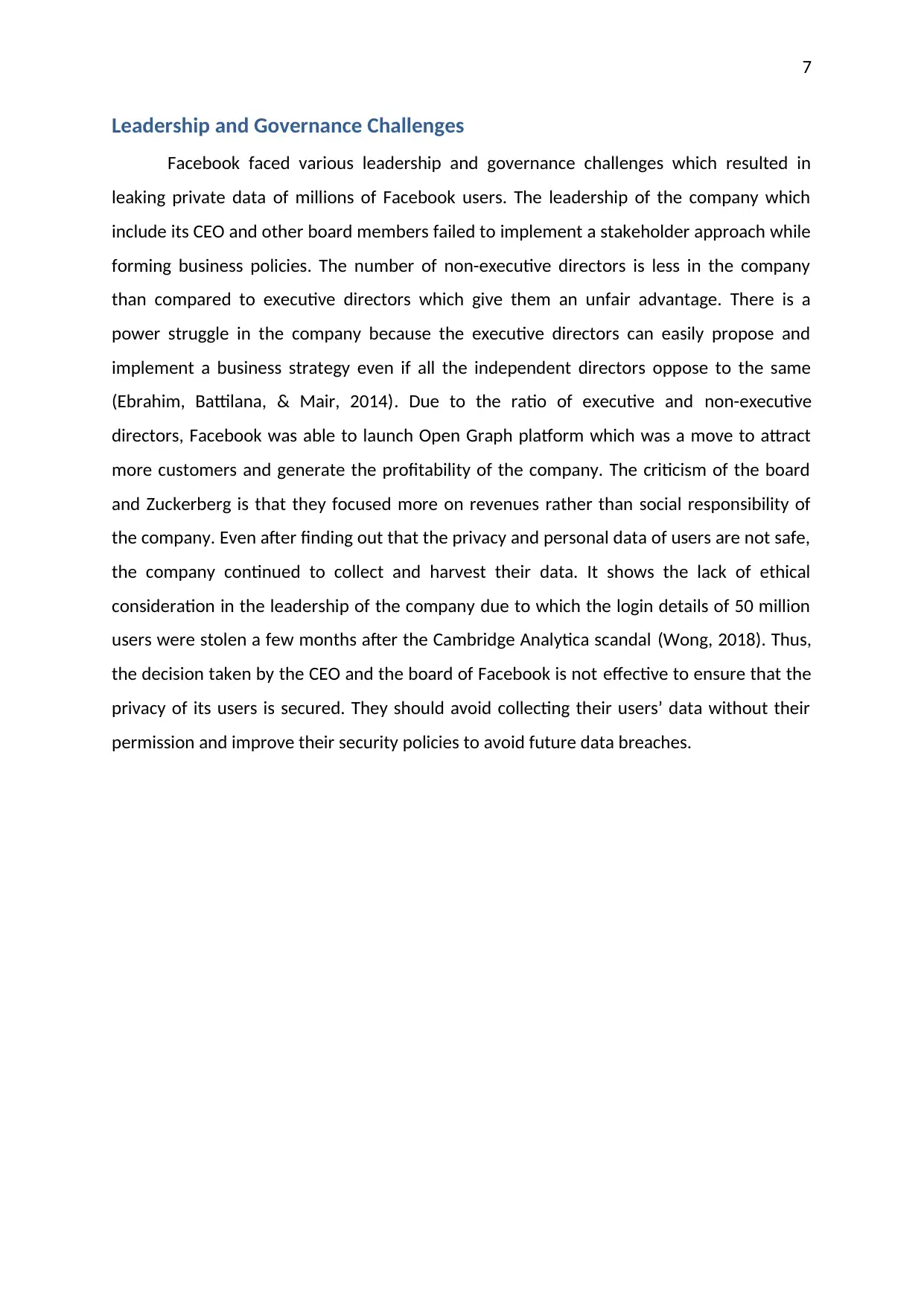
7
Leadership and Governance Challenges
Facebook faced various leadership and governance challenges which resulted in
leaking private data of millions of Facebook users. The leadership of the company which
include its CEO and other board members failed to implement a stakeholder approach while
forming business policies. The number of non-executive directors is less in the company
than compared to executive directors which give them an unfair advantage. There is a
power struggle in the company because the executive directors can easily propose and
implement a business strategy even if all the independent directors oppose to the same
(Ebrahim, Battilana, & Mair, 2014). Due to the ratio of executive and non-executive
directors, Facebook was able to launch Open Graph platform which was a move to attract
more customers and generate the profitability of the company. The criticism of the board
and Zuckerberg is that they focused more on revenues rather than social responsibility of
the company. Even after finding out that the privacy and personal data of users are not safe,
the company continued to collect and harvest their data. It shows the lack of ethical
consideration in the leadership of the company due to which the login details of 50 million
users were stolen a few months after the Cambridge Analytica scandal (Wong, 2018). Thus,
the decision taken by the CEO and the board of Facebook is not effective to ensure that the
privacy of its users is secured. They should avoid collecting their users’ data without their
permission and improve their security policies to avoid future data breaches.
Leadership and Governance Challenges
Facebook faced various leadership and governance challenges which resulted in
leaking private data of millions of Facebook users. The leadership of the company which
include its CEO and other board members failed to implement a stakeholder approach while
forming business policies. The number of non-executive directors is less in the company
than compared to executive directors which give them an unfair advantage. There is a
power struggle in the company because the executive directors can easily propose and
implement a business strategy even if all the independent directors oppose to the same
(Ebrahim, Battilana, & Mair, 2014). Due to the ratio of executive and non-executive
directors, Facebook was able to launch Open Graph platform which was a move to attract
more customers and generate the profitability of the company. The criticism of the board
and Zuckerberg is that they focused more on revenues rather than social responsibility of
the company. Even after finding out that the privacy and personal data of users are not safe,
the company continued to collect and harvest their data. It shows the lack of ethical
consideration in the leadership of the company due to which the login details of 50 million
users were stolen a few months after the Cambridge Analytica scandal (Wong, 2018). Thus,
the decision taken by the CEO and the board of Facebook is not effective to ensure that the
privacy of its users is secured. They should avoid collecting their users’ data without their
permission and improve their security policies to avoid future data breaches.
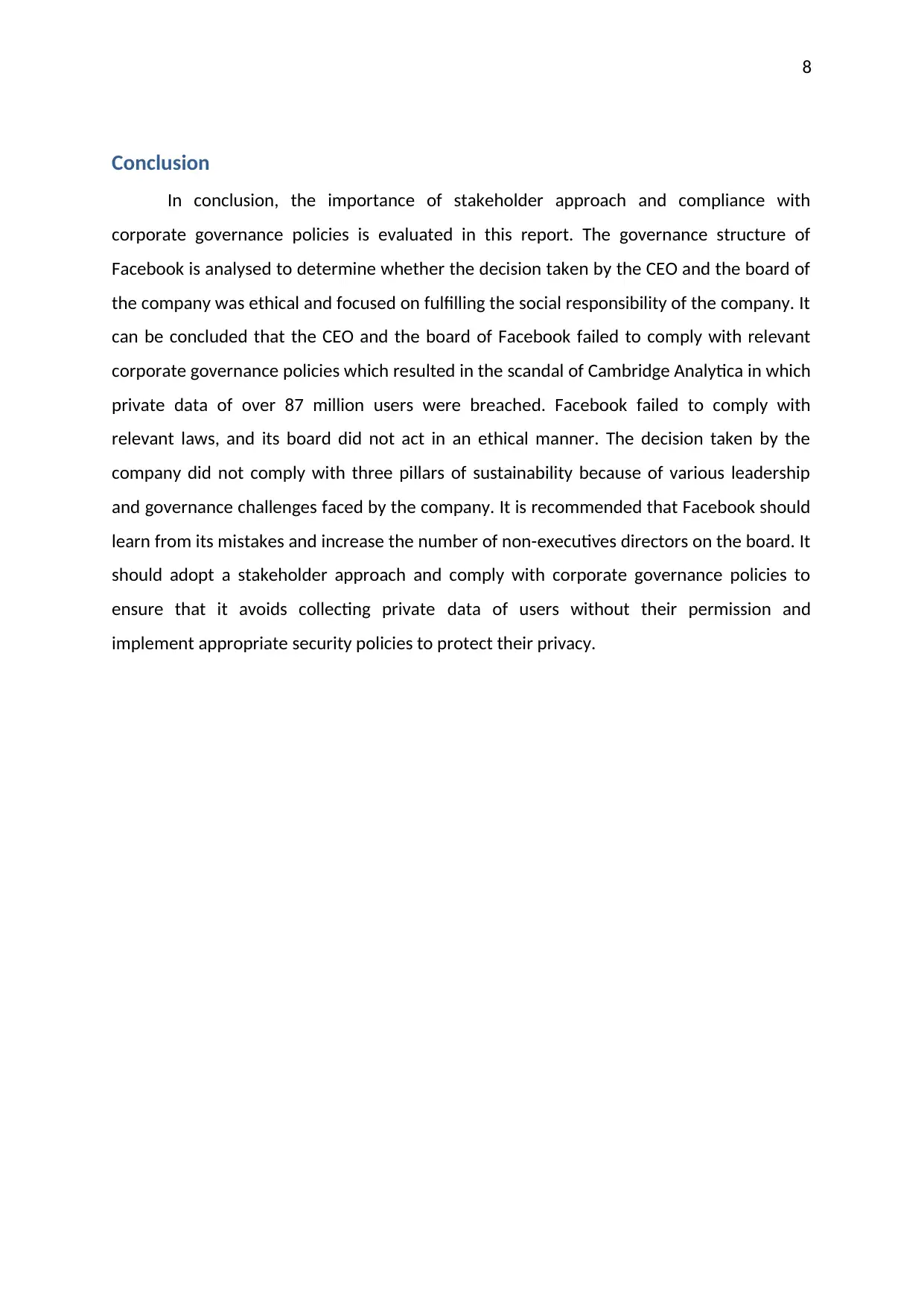
8
Conclusion
In conclusion, the importance of stakeholder approach and compliance with
corporate governance policies is evaluated in this report. The governance structure of
Facebook is analysed to determine whether the decision taken by the CEO and the board of
the company was ethical and focused on fulfilling the social responsibility of the company. It
can be concluded that the CEO and the board of Facebook failed to comply with relevant
corporate governance policies which resulted in the scandal of Cambridge Analytica in which
private data of over 87 million users were breached. Facebook failed to comply with
relevant laws, and its board did not act in an ethical manner. The decision taken by the
company did not comply with three pillars of sustainability because of various leadership
and governance challenges faced by the company. It is recommended that Facebook should
learn from its mistakes and increase the number of non-executives directors on the board. It
should adopt a stakeholder approach and comply with corporate governance policies to
ensure that it avoids collecting private data of users without their permission and
implement appropriate security policies to protect their privacy.
Conclusion
In conclusion, the importance of stakeholder approach and compliance with
corporate governance policies is evaluated in this report. The governance structure of
Facebook is analysed to determine whether the decision taken by the CEO and the board of
the company was ethical and focused on fulfilling the social responsibility of the company. It
can be concluded that the CEO and the board of Facebook failed to comply with relevant
corporate governance policies which resulted in the scandal of Cambridge Analytica in which
private data of over 87 million users were breached. Facebook failed to comply with
relevant laws, and its board did not act in an ethical manner. The decision taken by the
company did not comply with three pillars of sustainability because of various leadership
and governance challenges faced by the company. It is recommended that Facebook should
learn from its mistakes and increase the number of non-executives directors on the board. It
should adopt a stakeholder approach and comply with corporate governance policies to
ensure that it avoids collecting private data of users without their permission and
implement appropriate security policies to protect their privacy.
⊘ This is a preview!⊘
Do you want full access?
Subscribe today to unlock all pages.

Trusted by 1+ million students worldwide
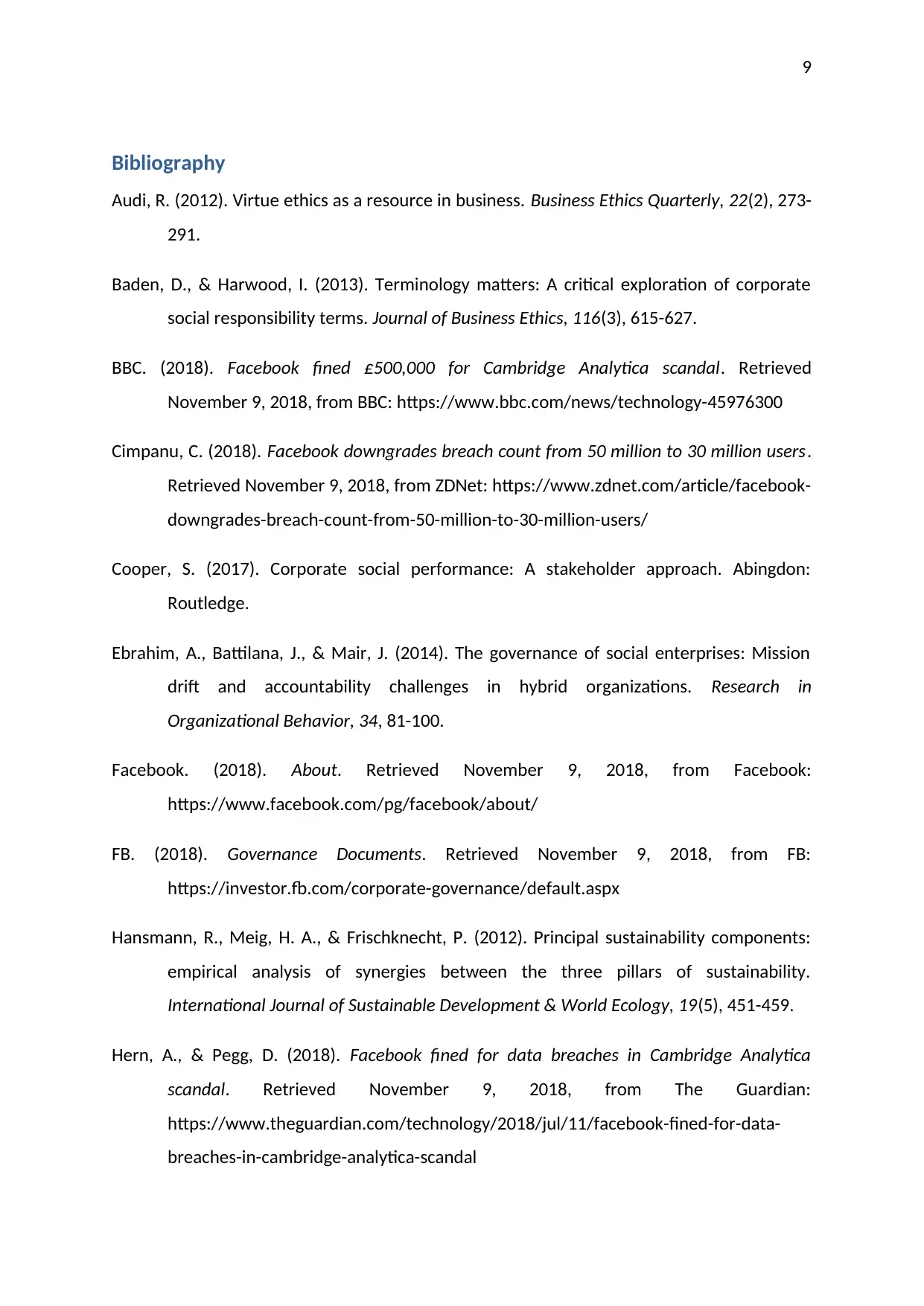
9
Bibliography
Audi, R. (2012). Virtue ethics as a resource in business. Business Ethics Quarterly, 22(2), 273-
291.
Baden, D., & Harwood, I. (2013). Terminology matters: A critical exploration of corporate
social responsibility terms. Journal of Business Ethics, 116(3), 615-627.
BBC. (2018). Facebook fined £500,000 for Cambridge Analytica scandal. Retrieved
November 9, 2018, from BBC: https://www.bbc.com/news/technology-45976300
Cimpanu, C. (2018). Facebook downgrades breach count from 50 million to 30 million users.
Retrieved November 9, 2018, from ZDNet: https://www.zdnet.com/article/facebook-
downgrades-breach-count-from-50-million-to-30-million-users/
Cooper, S. (2017). Corporate social performance: A stakeholder approach. Abingdon:
Routledge.
Ebrahim, A., Battilana, J., & Mair, J. (2014). The governance of social enterprises: Mission
drift and accountability challenges in hybrid organizations. Research in
Organizational Behavior, 34, 81-100.
Facebook. (2018). About. Retrieved November 9, 2018, from Facebook:
https://www.facebook.com/pg/facebook/about/
FB. (2018). Governance Documents. Retrieved November 9, 2018, from FB:
https://investor.fb.com/corporate-governance/default.aspx
Hansmann, R., Meig, H. A., & Frischknecht, P. (2012). Principal sustainability components:
empirical analysis of synergies between the three pillars of sustainability.
International Journal of Sustainable Development & World Ecology, 19(5), 451-459.
Hern, A., & Pegg, D. (2018). Facebook fined for data breaches in Cambridge Analytica
scandal. Retrieved November 9, 2018, from The Guardian:
https://www.theguardian.com/technology/2018/jul/11/facebook-fined-for-data-
breaches-in-cambridge-analytica-scandal
Bibliography
Audi, R. (2012). Virtue ethics as a resource in business. Business Ethics Quarterly, 22(2), 273-
291.
Baden, D., & Harwood, I. (2013). Terminology matters: A critical exploration of corporate
social responsibility terms. Journal of Business Ethics, 116(3), 615-627.
BBC. (2018). Facebook fined £500,000 for Cambridge Analytica scandal. Retrieved
November 9, 2018, from BBC: https://www.bbc.com/news/technology-45976300
Cimpanu, C. (2018). Facebook downgrades breach count from 50 million to 30 million users.
Retrieved November 9, 2018, from ZDNet: https://www.zdnet.com/article/facebook-
downgrades-breach-count-from-50-million-to-30-million-users/
Cooper, S. (2017). Corporate social performance: A stakeholder approach. Abingdon:
Routledge.
Ebrahim, A., Battilana, J., & Mair, J. (2014). The governance of social enterprises: Mission
drift and accountability challenges in hybrid organizations. Research in
Organizational Behavior, 34, 81-100.
Facebook. (2018). About. Retrieved November 9, 2018, from Facebook:
https://www.facebook.com/pg/facebook/about/
FB. (2018). Governance Documents. Retrieved November 9, 2018, from FB:
https://investor.fb.com/corporate-governance/default.aspx
Hansmann, R., Meig, H. A., & Frischknecht, P. (2012). Principal sustainability components:
empirical analysis of synergies between the three pillars of sustainability.
International Journal of Sustainable Development & World Ecology, 19(5), 451-459.
Hern, A., & Pegg, D. (2018). Facebook fined for data breaches in Cambridge Analytica
scandal. Retrieved November 9, 2018, from The Guardian:
https://www.theguardian.com/technology/2018/jul/11/facebook-fined-for-data-
breaches-in-cambridge-analytica-scandal
Paraphrase This Document
Need a fresh take? Get an instant paraphrase of this document with our AI Paraphraser
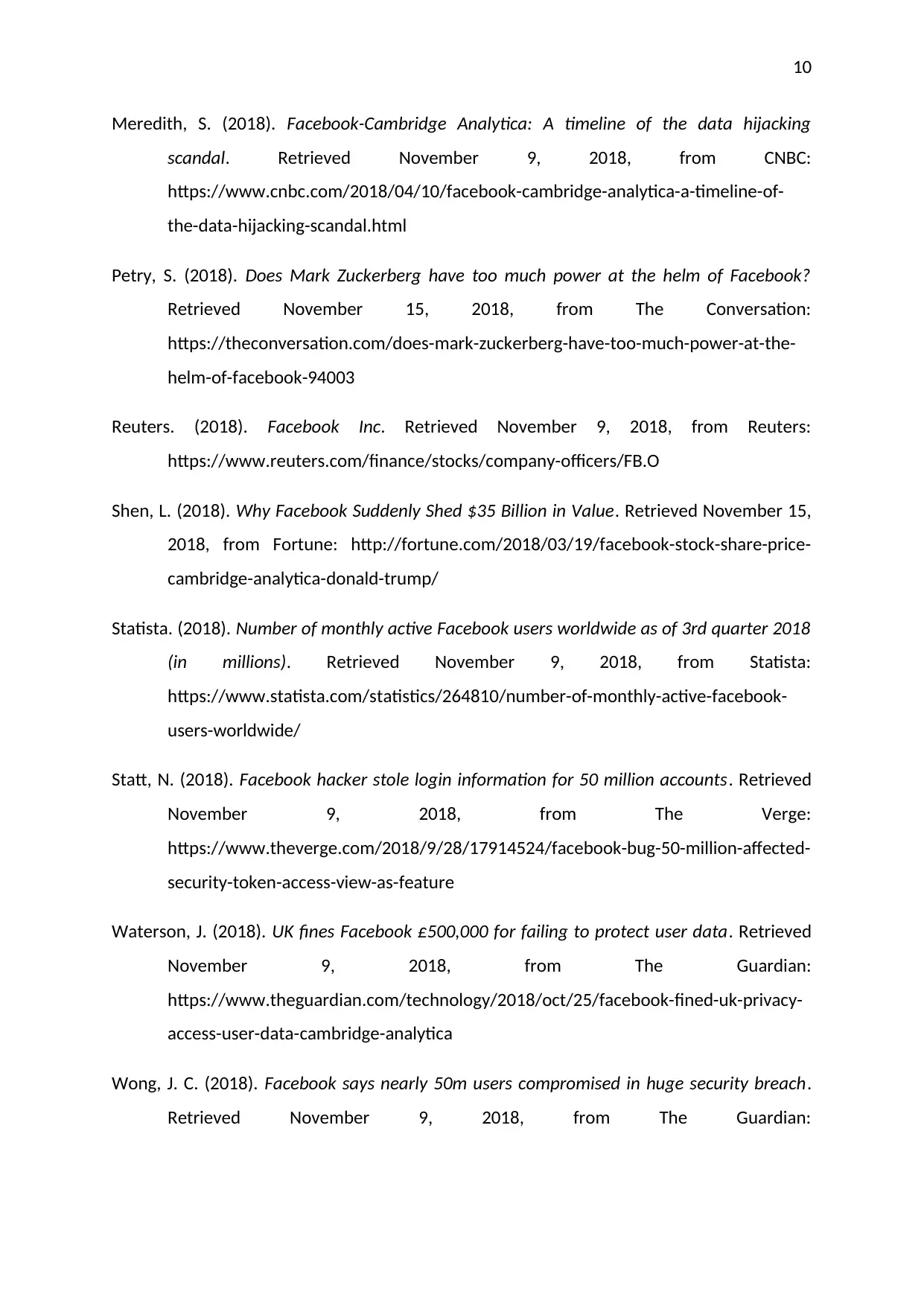
10
Meredith, S. (2018). Facebook-Cambridge Analytica: A timeline of the data hijacking
scandal. Retrieved November 9, 2018, from CNBC:
https://www.cnbc.com/2018/04/10/facebook-cambridge-analytica-a-timeline-of-
the-data-hijacking-scandal.html
Petry, S. (2018). Does Mark Zuckerberg have too much power at the helm of Facebook?
Retrieved November 15, 2018, from The Conversation:
https://theconversation.com/does-mark-zuckerberg-have-too-much-power-at-the-
helm-of-facebook-94003
Reuters. (2018). Facebook Inc. Retrieved November 9, 2018, from Reuters:
https://www.reuters.com/finance/stocks/company-officers/FB.O
Shen, L. (2018). Why Facebook Suddenly Shed $35 Billion in Value. Retrieved November 15,
2018, from Fortune: http://fortune.com/2018/03/19/facebook-stock-share-price-
cambridge-analytica-donald-trump/
Statista. (2018). Number of monthly active Facebook users worldwide as of 3rd quarter 2018
(in millions). Retrieved November 9, 2018, from Statista:
https://www.statista.com/statistics/264810/number-of-monthly-active-facebook-
users-worldwide/
Statt, N. (2018). Facebook hacker stole login information for 50 million accounts. Retrieved
November 9, 2018, from The Verge:
https://www.theverge.com/2018/9/28/17914524/facebook-bug-50-million-affected-
security-token-access-view-as-feature
Waterson, J. (2018). UK fines Facebook £500,000 for failing to protect user data. Retrieved
November 9, 2018, from The Guardian:
https://www.theguardian.com/technology/2018/oct/25/facebook-fined-uk-privacy-
access-user-data-cambridge-analytica
Wong, J. C. (2018). Facebook says nearly 50m users compromised in huge security breach.
Retrieved November 9, 2018, from The Guardian:
Meredith, S. (2018). Facebook-Cambridge Analytica: A timeline of the data hijacking
scandal. Retrieved November 9, 2018, from CNBC:
https://www.cnbc.com/2018/04/10/facebook-cambridge-analytica-a-timeline-of-
the-data-hijacking-scandal.html
Petry, S. (2018). Does Mark Zuckerberg have too much power at the helm of Facebook?
Retrieved November 15, 2018, from The Conversation:
https://theconversation.com/does-mark-zuckerberg-have-too-much-power-at-the-
helm-of-facebook-94003
Reuters. (2018). Facebook Inc. Retrieved November 9, 2018, from Reuters:
https://www.reuters.com/finance/stocks/company-officers/FB.O
Shen, L. (2018). Why Facebook Suddenly Shed $35 Billion in Value. Retrieved November 15,
2018, from Fortune: http://fortune.com/2018/03/19/facebook-stock-share-price-
cambridge-analytica-donald-trump/
Statista. (2018). Number of monthly active Facebook users worldwide as of 3rd quarter 2018
(in millions). Retrieved November 9, 2018, from Statista:
https://www.statista.com/statistics/264810/number-of-monthly-active-facebook-
users-worldwide/
Statt, N. (2018). Facebook hacker stole login information for 50 million accounts. Retrieved
November 9, 2018, from The Verge:
https://www.theverge.com/2018/9/28/17914524/facebook-bug-50-million-affected-
security-token-access-view-as-feature
Waterson, J. (2018). UK fines Facebook £500,000 for failing to protect user data. Retrieved
November 9, 2018, from The Guardian:
https://www.theguardian.com/technology/2018/oct/25/facebook-fined-uk-privacy-
access-user-data-cambridge-analytica
Wong, J. C. (2018). Facebook says nearly 50m users compromised in huge security breach.
Retrieved November 9, 2018, from The Guardian:
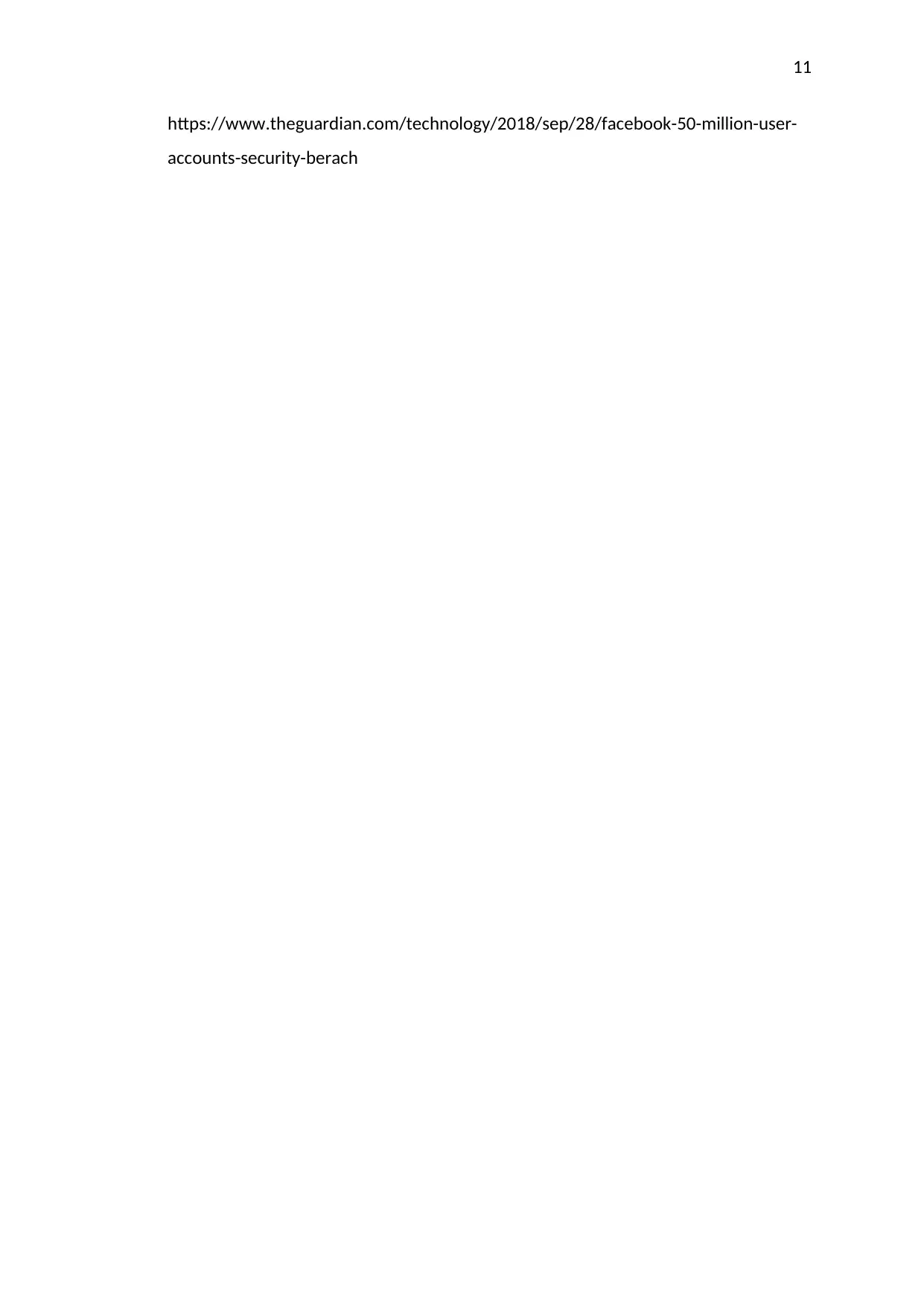
11
https://www.theguardian.com/technology/2018/sep/28/facebook-50-million-user-
accounts-security-berach
https://www.theguardian.com/technology/2018/sep/28/facebook-50-million-user-
accounts-security-berach
⊘ This is a preview!⊘
Do you want full access?
Subscribe today to unlock all pages.

Trusted by 1+ million students worldwide
1 out of 12
Related Documents
Your All-in-One AI-Powered Toolkit for Academic Success.
+13062052269
info@desklib.com
Available 24*7 on WhatsApp / Email
![[object Object]](/_next/static/media/star-bottom.7253800d.svg)
Unlock your academic potential
Copyright © 2020–2026 A2Z Services. All Rights Reserved. Developed and managed by ZUCOL.





